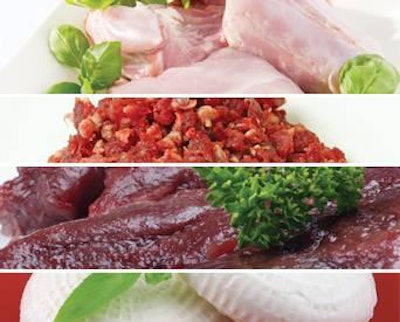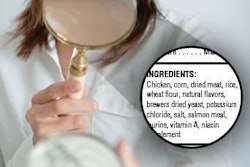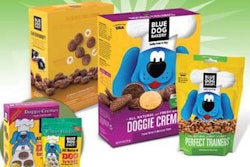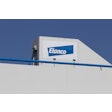
Consumers of pet products are expressing an increasing want for high-quality ingredients and formulas for their companion animals. One of their main concerns? A focus on the protein source. What country did it come from? Is it organic or grass-fed? Is it animal or plant or something in between? According to Trevor Faber, MS, in his Petfood Forum presentation Methods to Evaluate Protein Quality Among Animal Protein Sources, our industry has responded by a movement away from rendered by-products, an increased focus on quality and novelty and the use of alternative, unusual protein sources.
Although protein can be derived from a plethora of sources—from kangaroo and krill to egg and milk products to pea protein concentrate—the standard of quality must always meet certain standards, says Faber. These include:
- Nitrogen and amino acid content
- Digestibility
- Bioavailability
- Ability to aid growth, maintenance and repair of the body
Faber also says alternative proteins can be evaluated for quality by looking at their composition, amino acid score, biological value (BV) and protein efficiency ratio, and through digestibility trials. So how do novel protein-formulated petfoods and treats on the market measure up to more common protein blends? Are they more sustainable, economical or healthful?
Addiction Pet Foods prides itself on being a pioneer when it comes to the use of novel proteins in their dog and cat food formulas. Addiction makes a wild kangaroo dry dog food blend, as well as New Zealand brushtail and unagi (eel) wet cat foods. Their protein sources are from New Zealand, Australia, the US and Canada, and are carefully chosen to ensure that products adhere to their eco-friendly philosophy.
According to the company, kangaroo contains the highest levels of conjugated linoleic acid of any red meat. And because the kangaroo is harvested from the wild, it’s free from antibiotics and hormones and only contains 2% fat, making it ideal for a dog's diet. In 2011, Addiction introduced two cat foods using ingredients never used before in petfood formulas, claims the company. Brushtail is a non-indigenous marsupial that causes widespread damage to farmland and native habitats of New Zealand. It is also a great source of protein with a unique flavor and higher levels of Omega-3 fatty acids than any other meat. New Zealand brushtail is an ideal novel protein source for animals sensitive to chicken, beef and lamb. Unagi has high levels of Omega-3 fatty acids as well, and is balanced with seaweed for its rich antioxidant, vitamin, mineral and fiber, says the company.
Another alternative (and sometimes controversial) novel protein popping up in pet treats and foods is raw goat's milk. According to Natural News, goat's milk has vitamins, minerals, trace elements, electrolytes, enzymes, proteins and fatty acids that are easily assimilated by an animal's body. Goat's milk does not contain the complex protein in cow's milk that stimulates allergic reactions, can also boost the immune system and alkalizes the digestive system, helping to increase the pH level in the blood stream.
Additionally, says Natural News, raw goat's milk fights microbes, primarily due to the healthy medium-chained fatty acids it contains, such as capric and caprylic acids. It is very important to note that raw goat's milk is rich in selenium, a necessary bodily nutrient known for its immune-strengthening and antioxidant properties. Raw goat's milk may also be a good alternative for companion animals with sensitive digestive tracts.















